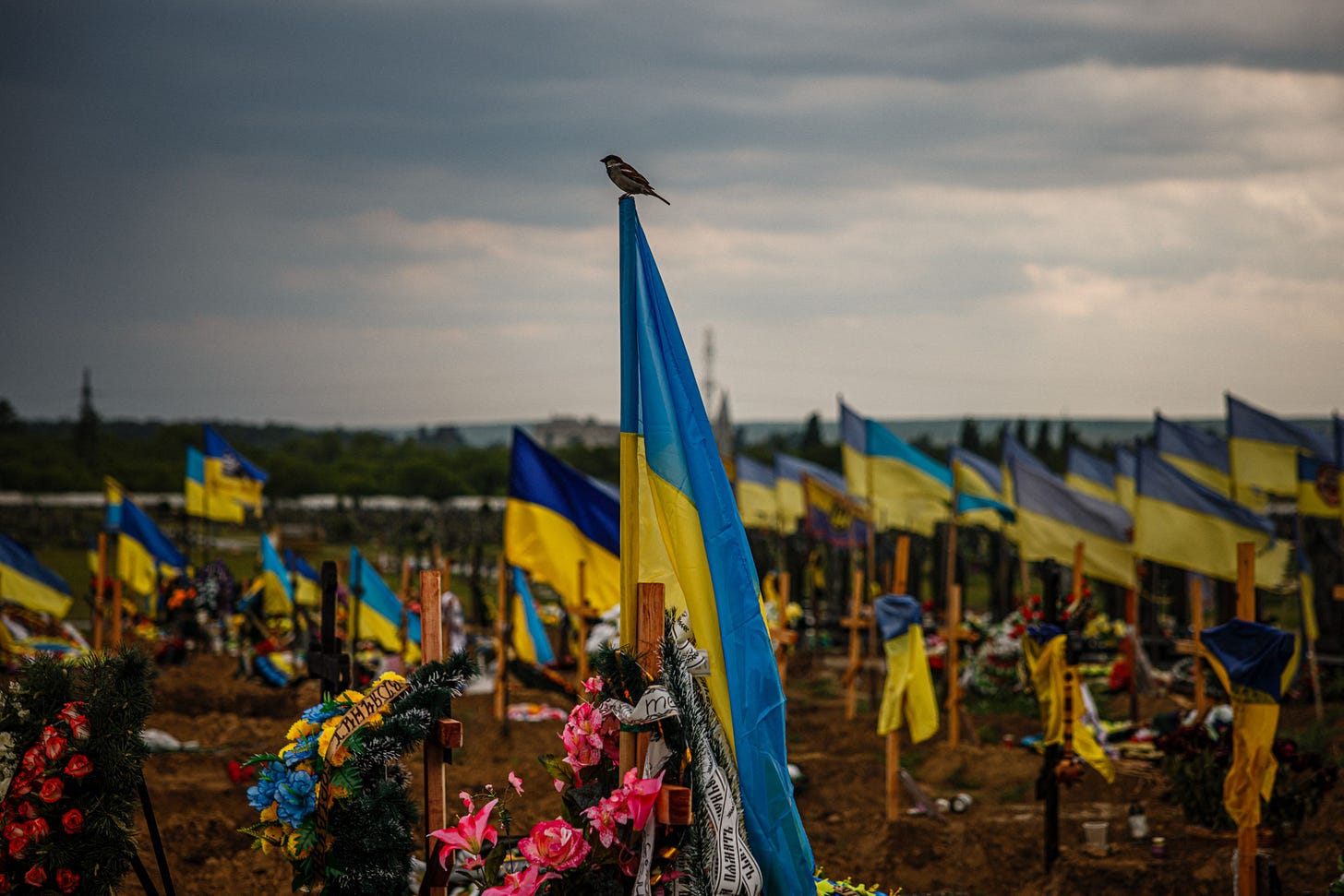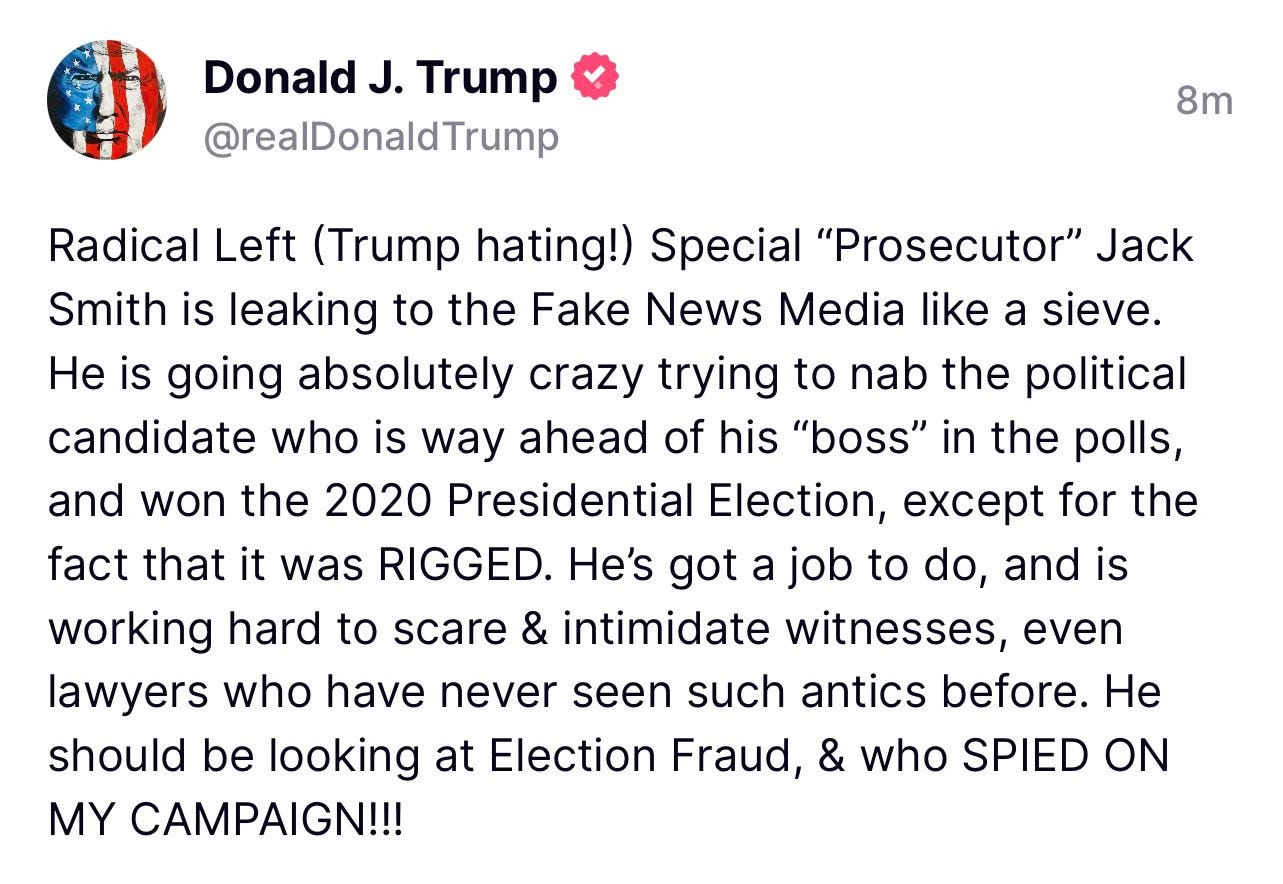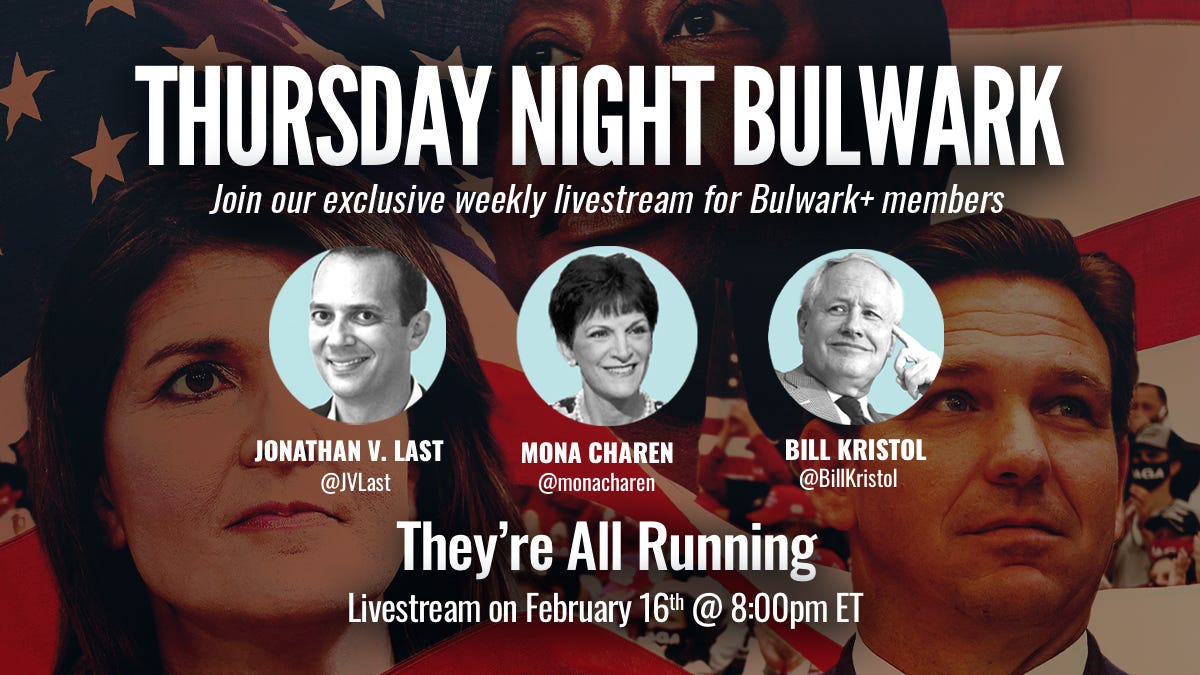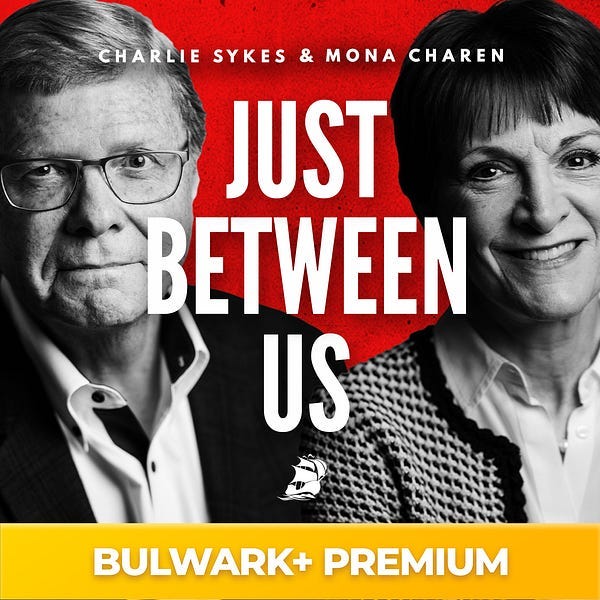
We actually have some important issues to wrestle with, but could we take a moment to ponder this?
“Yes, Elon Musk created a special system for showing you all his tweets first.”
And, no, it’s not a parody.
**
Meanwhile, back in reality: U.S. on Track to Add $19 Trillion in New Debt Over 10 Years. Of more immediate concern, the government faces default on its debt sometime this summer if Congress can’t scrape together enough adults to prevent it.
If you’re just catching up, Matt Gaetz is skating on sex trafficking charges; but Fox News has had a horrific week in court. Sometime today we should get some of the details from the Georgia grand jury probing Donald Trump’s election interference; the special counsel seems to be pivoting toward “obstruction” in the Mar-a-Lago document case; while Mike Pence confirms that he’ll fight the special counsel subpoena, because he’d rather run for president than testify truthfully under oath. (BTW, even National Review’s resident lawyer/pundit thinks his claim of immunity is bullsh*t.)
And, in a sign that Jack Smith may be moving at ramming speed, the special counsel has subpoenaed Trump’s COS Mark Meadows… he of the many, many incriminating text messages. The former president does not seem to be taking it well:
Happy Thursday.
Join Us Tonight!
Speaking of Nikki…
As you have no doubt noticed, her campaign is “exciting,” telegenic, history-making, and… pointless. Tom Nichols writes in The Atlantic:
For all her talk about “a new generation,” Haley knows that the Republican base doesn’t want to move on. Those voters, to judge from the polls, want Trump, unless he can’t win; in that case, they’d like a Trump who can win, a candidate who reeks of Trump’s cheap political cologne but who will wisely wear somewhat less of it while campaigning in the crowded spaces of a general election.
And speaking of pointlessness:
**
Pence’s quixotic strategy also seems to be coming into focus. Via Politico:
Former Vice President Mike Pence wants to make something clear: No 2024 Republican presidential candidate will outflank him on the gender, sexuality and education controversies that animate the right.
He’s staking a claim as an original, if sunnier, culture warrior — a bona fide alternative to Florida Gov. Ron DeSantis or former South Carolina Gov. Nikki Haley.…
ICYMI: A murder. And a quid pro quo.
You can listen to my whole conversation with the Wapo’s Michael Kranish here. **
And here’s a bonus for Bulwark + members:
You can listen to our latest here.
Applebaum: One Year Into The War
One year later, where do things stand in Ukraine? What have we learned about the character of Ukraine, Putin’s war aims, the fault lines in European politics, and America's resolve? Why should the West continue to support Ukraine?
Bill Kristol was joined by Anne Applebaum, a leading scholar of Ukraine, and a Pulitzer Prize winning historian.
Below are excerpts from the Conversation
On what we’ve learned about Ukraine from its defense and resolve
APPLEBAUM: I think what has happened is that the Ukrainians have shown, first of all, that their army and their military were far better prepared, psychologically, and in terms of planning, than anybody had guessed. The country didn't produce lots of ammunition in advance. They didn't reinforce their cities in advance. There were things in retrospect that could have been done, and if you go around Ukraine, you hear people say that. And it would have been nice to have wider, broader social preparation, but the army was prepared.
And the army has also shown itself to be very creative. It uses what equipment it has, whether it's drones you can buy on the internet, and they call it MacGyvering. Fixing them up to be able to do other things they weren't supposed to be able to do. They're extremely creative. They use their weapons well. There is no hint, by the way, of any corruption to do with the army.
And the other thing that has been, again, not surprising if you knew Ukraine, but really, by comparison to other societies in other times and places, Ukrainian society, the way in which spontaneous volunteer groups have organized themselves, whether to help the army, or to help refugees, or to run cities: people really rising to the challenge in extraordinary ways. It's always been a kind of grassroots society. It's better ground-up. The state was always much weaker than the society, and it was always a place where people were suspicious of power, but able to organize on the ground.
When people write the history of the war, and when they look back, they will talk about some of the lack of preparation. They will talk about some weaknesses in Zelensky's government. There are things people don't like, and I even wonder whether he'll be reelected, even assuming they win. But he has also surpassed expectations as well. People said, “He's an actor. He's a comedian. What does he know about wars?” But it turns out he's not only that, he's also a television producer. Everybody around him is a television producer. They think a lot about how to send a message, how to galvanize people at home, how to speak to people abroad. And he is, of course, one of the great discoveries of the war.
On Putin’s war aims, and why the West should continue to support Ukraine
APPLEBAUM: Putin is still saying, and the TV propagandas are still saying: “Our goal is to destroy Kyiv and make Ukraine into a puppet state.” And this is one of biggest problems I have with the chorus of people who say, “We need to trade land for peace,” or “we need to negotiate.” Okay, great. Let’s negotiate. Now explain to me, how are you going to get Putin to give up on his main goal, which is the conquest of Kyiv? Because until he does that, what are we negotiating about? “Okay, we can have a ceasefire” [someone might say]. We could stop fighting for six months. Meanwhile, he rebuilds his army, he gets some more weapons from Iran, and then he rebuilds the army and starts again. So do you want to have another war next year or in two years? This isn’t a reasonable way to end the war.
And there’s kind of bogus “stop the war for Ukraine’s sake. Ukraine’s country is being destroyed.” That’s true. But what option does Ukraine have? Stopping the fighting means that the country is occupied in the ways we’ve just described. All leaders will be dead and all of the children will be deported and the country will be destroyed if it’s occupied. So the Russians aren’t giving them a choice. And so they have to fight back.
And therefore, the point of our continuing to support Ukraine and the point of Ukraine fighting should be to continue to fight until there is some kind of change in Russia. And I’m not going to tell you what that is. I don’t know whether it’s replacing Putin or whether Putin himself changes or whether something else happens. But Russia must get to the stage that France was when it decided it no longer wanted to be a colonial power in Algeria, or that Britain did in Ireland at the beginning of the 20th century: “Okay this is not part of our country anymore.” So they need to overcome that imperial instinct and give up.On the scale of Russian atrocities
APPLEBAUM: 1945 might even be the wrong year to use, because for me, what it reminds me the most of is what the Red Army did when it occupied Central Europe in '44, '45, '46, '47. It's the same kind of, “Decapitate society. Do mass arrests. Send people to prison, and try and reshape the society.” And the level of cruelty and violence that is being used there, forget the war zones. I'm not even talking about places where people are being bombarded. And the pictures you see on TV are mostly war zones. Where you aren't seeing is what's happening in occupied Ukraine. And it's important to understand that, because when we start talking about how the war is going to end, and whether the Ukrainians can trade territory away or not. The issue isn't the territory or the land. The issue is what has happened to people in those places, and what is going on now. Everybody in Ukraine knows this, but I don't know that the outside world understands this story. We are talking about concentration camps, mass murder, torture, arrests, torment of children, all inflicted on these zones of occupation. And the level of the crime and the knowledge of it is, I think, only just beginning right now to seep out of Ukraine.
On American support for Ukraine
APPLEBAUM: I am really grateful that Biden was president during this last year and that he had enough of a, I don't know whether it was kind of Cold War muscle memory or whether it was personal dedication to the idea that US and European security are linked, or whether it was his long experience of traveling back and forth to that region. He did step up to the plate. He did make it clear that we would help Ukraine. And I think they too, at the beginning, were, they were not sure what would happen. And as you remember, the first couple of days in the war, they offered Zelenskyy a ride out. I think they imagined what they were going to be doing was helping the Ukrainians in exile somewhere, in Poland or somewhere, fight a guerilla war, and this obviously turned into something on a different scale.
Having said that, there have been moments when I wished the administration would move faster. There is a lot of, Biden has made it clear that he doesn't want any Americans fighting there and he doesn't want any NATO troops fighting there. And there is a paranoia about what will the Russians do? Will they react to this weapon or that weapon? What can we give the Ukrainians? And I have worried and continue to worry that what the Ukrainians, the Ukrainians aren't always being given what they need to win in time to use it. And since the decision about the tanks, for example, that was taken a few weeks ago, that was late. Couldn't we have made that decision a few months earlier so that the Ukrainians were training on the tanks and they could have already been in the field by now? And we seem to be kind of several beats behind almost every time.
On Zelensky’s defense of liberal nationalism and patriotism
APPLEBAUM: This is why Zelensky has been so successful around the world, and why he has such a deep appeal: He has combined, on the one hand, liberal values with, on the other hand, nationalism, or patriotism, or whatever you want to call it. What he does is a patriotic, nationalistic defense of liberal values. And that's why he can appeal to a wide part of the political spectrum, not just in the US, but all across Europe, because people can identify with that. And it's a thing that people have felt to be missing. And I think that's the source of it. And again, it also works because it's true. His government and his administration is not ethnically Ukrainian, and doesn't have an attachment to ethnic nationalism. They were elected as a representative of civic patriotism. Nobody ever uses that kind of language in Ukraine, but that's in effect what he stood for, and so it's real.
Quick Hits
Keep the New Russian Offensive in Perspective, by Giselle Donnelly
‘The Sun and Sky Were Darkened’: The Politics of the Train Derailment, by Daniel McGraw
Beijing-Controlled Hong Kong Tries, Lamely, to Buff Up Its Image, by Ellen Bork
Lashing Out, Rod Dreher (Again) Reveals His Ignorance of Hungary, by H. David Baer








The whole debt ceiling debate and the Medicare/Social Security are going bankrupt talk from Republicans is driving me insane. Remember when we had budget surpluses? 1998-2001. Then Republicans decided that funding the government adequately was killing their mojo and their message that government sucks so they gave away the funds balancing the budget and removed the spending caps that were keeping everything under control. Obviously Democrats didn’t help, but it was Republicans who gave away the money.
"The issue isn't the territory or the land. The issue is what has happened to people in those places, and what is going on now. Everybody in Ukraine knows this, but I don't know that the outside world understands this story. We are talking about concentration camps, mass murder, torture, arrests, torment of children, all inflicted on these zones of occupation. And the level of the crime and the knowledge of it is, I think, only just beginning right now to seep out of Ukraine."
This is obviously horrifying, but it's really difficult not to see the WWII parallels. We did not go to war against the Nazis because of the Holocaust, and I think at the time their atrocities against the Jews were not front of mind. The pace of the holocaust accelerated as the war went on. But, I think a lot of Americans in retrospect, upon learning what was going down in the KLs, thought that stopping that kind of evil would have been a sufficient causus belli, and really wished we had've gone after the Nazis just for being so evil.
As Churchill said, you can count on America to do the right thing, after it has exhausted all other options. WWII was mostly fought in a pre-nuclear era, and nuclear weapons must be considered in any calculus in today's world. But this reality that you can just do whatever you want if you have nukes, something no one has really flaunted so brazenly as Putin with this horrible war, is a serious problem.